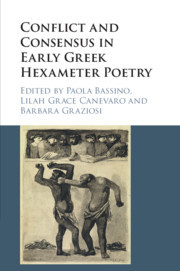Description
Conflict and Consensus in Early Greek Hexameter Poetry
Coordinators: Bassino Paola, Canevaro Lilah Grace, Graziosi Barbara
A fresh and wide-ranging exploration across the whole of early Greek hexameter poetry, focusing on issues of poetics and metapoetics.
Language: English
Subject for Conflict and Consensus in Early Greek Hexameter Poetry:
Conflict and Consensus in Early Greek Hexameter Poetry
Publication date: 08-2021
Support: Print on demand
Publication date: 08-2021
Support: Print on demand
Conflict and Consensus in Early Greek Hexameter Poetry
Publication date: 04-2017
238 p. · 15.8x23.5 cm · Hardback
Publication date: 04-2017
238 p. · 15.8x23.5 cm · Hardback
Description
/li>Contents
/li>Biography
/li>
Achilles inflicts countless agonies on the Achaeans, although he is supposed to be fighting on their side. Odysseus' return causes civil strife on Ithaca. The Iliad and the Odyssey depict conflict where consensus should reign, as do the other major poems of the early Greek hexameter tradition: Hesiod's Theogony and the Homeric Hymns describe divine clashes that unbalance the cosmos; Hesiod's Works and Days stems from a quarrel between brothers. These early Greek poems generated consensus among audiences: the reason why they reached us is that people agreed on their value. This volume, accordingly, explores conflict and consensus from a dual perspective: as thematic concerns in the poems, and as forces shaping their early reception. It sheds new light on poetics and metapoetics, internal and external audiences, competition inside the narrative and competing narratives, local and Panhellenic traditions, narrative closure and the making of canonical literature.
Introduction; Part I. Gods: 1. Conflict, consensus and closure in Hesiod's Theogony and Enūma eliš Johannes Haubold; 2. Divine conflict and the problem of Aphrodite Barbara Graziosi; 3. Sparring partners: fraternal relations in the Homeric Hymn to Hermes Oliver Thomas; Part II. Heroes: 4. Achilles in control? Managing oneself and others in the funeral games Adrian Kelly; 5. Uncertainty and the possibilities of violence: the quarrel in Odyssey 8 Jon Hesk; 6. ΙΡΟΣ ΙΑΜΒΙΚΟΣ: archilochean Iambos and the Homeric poetics of conflict Donald Lavigne; 7. Conflict and consensus in the epic cycle Jim Marks; Part III. Men: 8. Fraternal conflict in Hesiod's Works and Days Lilah Grace Canevaro; 9. On constructive conflict and disruptive peace: the Certamen Homeri et Hesiodi Paola Bassino.
Paola Bassino is Lecturer in Classical Studies at the University of Winchester. She has published articles on the biographical tradition of the Greek epic poets, and is the author of a forthcoming edition and commentary of the Certamen Homeri et Hesiodi. Her current research includes a study of the interactions between the Sophists and the epic tradition and of the Renaissance reception of Homer.
Lilah Grace Canevaro is Leverhulme Early Career Fellow in Classics at the University of Edinburgh. She is the author of Hesiod's Works and Days: How to Teach Self-Sufficiency (2015) and has published articles on Hesiod, Homer, Old Norse didactic, Victorian poetry and art, and cognitive approaches to poetry. She is currently working on a book about women and objects in Greek epic.
Barbara Graziosi is Professor of Classics and Head of Department at the University of Durham. She has published extensively on ancient Greek literature and culture, including most recently The Gods of Olympus: A History (2013) and Homer (2016). She recently completed a research project, funded by the European Research Council, on visual and narrative portraits of ancient Greek and Roman poets.
Lilah Grace Canevaro is Leverhulme Early Career Fellow in Classics at the University of Edinburgh. She is the author of Hesiod's Works and Days: How to Teach Self-Sufficiency (2015) and has published articles on Hesiod, Homer, Old Norse didactic, Victorian poetry and art, and cognitive approaches to poetry. She is currently working on a book about women and objects in Greek epic.
Barbara Graziosi is Professor of Classics and Head of Department at the University of Durham. She has published extensively on ancient Greek literature and culture, including most recently The Gods of Olympus: A History (2013) and Homer (2016). She recently completed a research project, funded by the European Research Council, on visual and narrative portraits of ancient Greek and Roman poets.
© 2024 LAVOISIER S.A.S.
These books may interest you

Early Greek Hexameter Poetry 23.76 €



